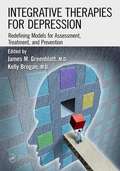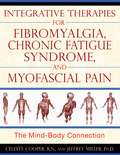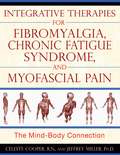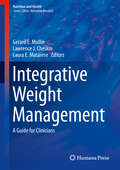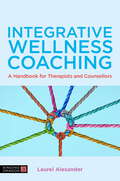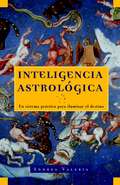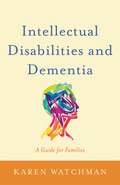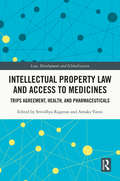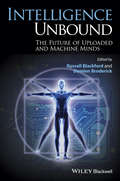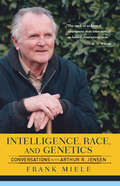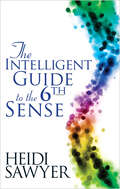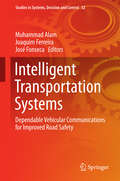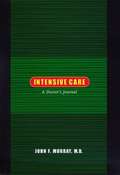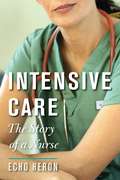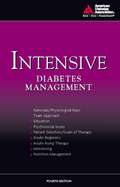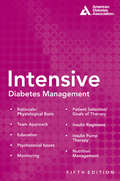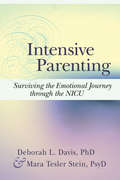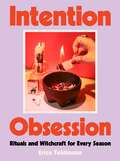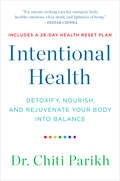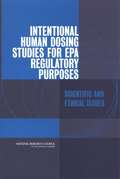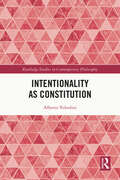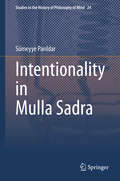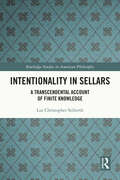- Table View
- List View
Integrative Therapies for Depression: Redefining Models for Assessment, Treatment, and Prevention
by James M. Greenblatt Kelly BroganSupported by the review of nearly 3000 scientific studies, the book describes the concepts of inflammation, genetics, hormonal imbalance, gastrointestinal conditions, environmental stress, and nutritional deficiencies and their possible link to the pathogenesis of mood disorders. It also examines findings on various nonpharmaceutical therapies used to treat mood disorders including vitamins, botanicals, and other natural products as well as exercise, stress reduction, bright light, mind-body practices, and spiritual approaches. Also covered are evidence-based approaches to integrative management of mood disorders in pregnant women, adolescents, and the elderly. Separating facts from fiction, the book provides practical information that clinicians can implement and share with their patients. The book fills a significant gap in the conventional model of therapeutics for mood disorders. It is a valuable resource for psychiatrists, psychologists, family therapists, and all other clinicians who devote their days to caring for those afflicted with depression.
Integrative Therapies for Fibromyalgia, Chronic Fatigue Syndrome, and Myofascial Pain
by Celeste Cooper Jeffrey MillerFibromyalgia, chronic myofascial pain, and chronic fatigue are often seen as interchangeable conditions, a belief held even by many health care providers. Nothing could be further from the truth--however, they do often coexist. Knowing if more than one of these disorders is present is extremely important, because the treatment for one of them can often exacerbate the problems caused by the others. Written by a registered nurse and a psychologist who has been treating these conditions since 1994, this book presents an integrative medical approach to these three disorders with a strong emphasis on utilizing and strengthening the mind-body connection to restore well-being. The authors begin with clear diagnostic guidelines for each condition and reference the latest scientific research on what causes these illnesses. Because many medical practitioners are relatively unfamiliar with these disorders, it can take several medical visits to arrive at a definitive diagnosis. Clear communication with medical personnel is key to diagnostic success. This book provides invaluable advice on how to describe symptoms, document health history, and keep a log of medical appointments. Included are interactive worksheets to facilitate these activities. The authors provide a thorough guide to numerous treatment options--from diet, exercise, and herbs to mindfulness meditation, yoga, and nonsteroidal anti-inflammatory drugs (NSAIDs). They also offer techniques to dispel the "brain fog" that these illnesses can create, offer guidance on the psychological issues that accompany these chronic pain disorders, and provide advice on how to build a personal support team. The final chapter gives advice on how to navigate the health care system, including step-by-step instructions for preparing an application to the Social Security Administration for disability benefits. An extensive resource section provides a wealth of contact information for helpful agencies and organizations, good sources for medical supplies, and a wide selection of suggested further reading. In short, this integrative treatment guide will open the door not only to physical recovery but also to emotional, mental, and spiritual well-being. CELESTE COOPER, R.N., worked as a nurse and nurse educator for more than 20 years before being diagnosed with fibromyalgia, chronic myofascial pain, and chronic fatigue syndrome. She is now an advocate for sufferers of these disorders and lives in Missouri and Arizona. JEFFREY MILLER, Ph.D., is a psychologist specializing in chronic illness from a spiritual perspective. He lives in Missouri.
Integrative Therapies for Fibromyalgia, Chronic Fatigue Syndrome, and Myofascial Pain: The Mind-Body Connection
by Celeste Cooper Jeffrey MillerA guide to coping with fibromyalgia, myofascial pain, and chronic fatigue syndrome • Reveals how to deal with each disorder and how treatments can interact or aggravate if more than one disorder is present • Offers techniques to dispel the side effects created by these illnesses Fibromyalgia, chronic myofascial pain, and chronic fatigue syndrome are often seen as interchangeable conditions, a belief held even by many health care providers. Nothing could be further from the truth--however, they do often coexist. Knowing if more than one of these disorders is present is extremely important because the treatment for one of them can often exacerbate the problems caused by the others. Written by a registered nurse and a psychologist who has been treating these conditions since 1994, this book presents an integrative medical approach to these three disorders with a strong emphasis on utilizing and strengthening the mind-body connection to restore well-being. The authors provide a thorough guide to numerous treatment options--from diet, exercise, and herbs to mindfulness meditation, chi kung, and nonsteroidal anti-inflammatory drugs (NSAIDs). They also offer techniques to dispel the “brain fog” that these disorders often create and show how to overcome the resultant obstacles to effectively communicating with your doctor. The additional information included on the psychological issues that accompany these chronic pain disorders allows this integrative treatment guide to open the door not only to physical recovery but also emotional and mental well-being.
Integrative Weight Management
by Gerard E. Mullin Lawrence J. Cheskin Laura E. MatareseIntegrative Weight Management: A Guide for Clinicians intends to educate physicians and nutritionists about the wide ranges of approaches to weight control from non-traditional sources. The options for weight management in conventional practices are limited to a small number of medications, a confusing array of dietary approaches and surgical procedures with their inherent risks and complications Unfortunately medical practitioners are not exposed to nutrition and weight control principles during training and thus are reluctant to manage their patients weight control issues This volume is structured into 4 sections: Introduction to Weight Management Disorders; Morbidity and Mortality of Obesity; Therapy of Obesity; and Integrative Medicine and Obesity Integrative Weight Management: A Guide for Clinicians represents a powerful collaboration of dozens of leading experts in the fields of nutrition, weight management and integrative medicine who have managed countless numbers of patients and summarized the research from thousands of articles to create an up-to- date state of the art guide for healthcare practitioners, allied health professionals and public health authorities who manage those who are overweight/obese along with the associated metabolic consequences.
Integrative Wellness Coaching: A Handbook for Therapists and Counsellors
by Laurel AlexanderBy presenting a holistic and integrated health and wellbeing approach to personalised care through wellness coaching, this handbook provides theory, insights, best practice, case studies and CPD activities in order to deepen practitioners' knowledge and experience.Integrative wellness is about working in collaboration and is a partnership between the professional and the patient with the latter understanding that they can take as much control as is possible for their own health and wellbeing. This book helps form this collaboration by exploring the co-creation of personalised care plans, effective coaching skills and cognitive-behavioural interventions including motivational coaching for patient activation, as well as flexible ways to provide wellness coaching.Exploring how the mind-body connection can improve the patient's journey, Integrative Wellness Coaching is an invaluable guide for any healthcare practitioner who wants to embrace their patients' lifestyle choices and mindsets towards their own health.
Inteligencia Astrologica
by Sherri Rifkin Andrea ValeriaCreate your own destiny in three simple steps!Andrea Valeria, best-selling author, radio talk-show host, and astrologer, shows you how with this uniquely practical and fun approach to making everyday decisions by using astrology as your personal tool. Using the easy-to-read chart in the front of the book, decode where you are in your decision-making process by matching your astrological sign to the situation you find yourself in: approaching, questioning, strategizing, negotiating, bonding, or building. The chart readily leads you to the word that will help you not only make a decision, but also decipher the most effective way of relating to your friends, lovers, colleagues, family, and so on. Inteligencia Astrológica is a step-by-step guide to successfully making the everyday choices that shape the quality of our lives.__________íIlumina tu destino con este sistema práctico y sencillo de auto-ayuda!Con Inteligencia Astrológica, Andrea Valeria iluminará tu destino con consejos prácticos que te ayudarán a encontrarle salida a cualquier embrollo, distancia a toda dificultad, manera de acercarte a quien quieras y de comenzar a tomar los pasos adecuados para lograr tus propósitos. Además, Inteligencia Astrológica te enseñara cómo puedes aprovechar las características positivas de cada uno de los los otros signos del zodíaco en relación con el tuyo.Necesitas un aumento de sueldo, ál estrategia debes tomar?Estás a punto de comprar una casa, ómo le haces para negociar?ás pensando en mudarte a otra ciudad?¿Tienes problemas con tu pareja?¿Sospechas que tu pareja te engaña?From the Trade Paperback edition.
Inteligencia astrológica
by Andrea ValeriaCreate your own destiny in three simple steps! Andrea Valeria, best-selling author, radio talk-show host, and astrologer, shows you how with this uniquely practical and fun approach to making everyday decisions by using astrology as your personal tool. Using the easy-to-read chart in the front of the book, decode where you are in your decision-making process by matching your astrological sign to the situation you find yourself in: approaching, questioning, strategizing, negotiating, bonding, or building. The chart readily leads you to the word that will help you not only make a decision, but also decipher the most effective way of relating to your friends, lovers, colleagues, family, and so on. Inteligencia Astrológica is a step-by-step guide to successfully making the everyday choices that shape the quality of our lives. __________ íIlumina tu destino con este sistema práctico y sencillo de auto-ayuda! Con Inteligencia Astrológica, Andrea Valeria iluminará tu destino con consejos prácticos que te ayudarán a encontrarle salida a cualquier embrollo, distancia a toda dificultad, manera de acercarte a quien quieras y de comenzar a tomar los pasos adecuados para lograr tus propósitos. Además, Inteligencia Astrológica te enseñara cómo puedes aprovechar las características positivas de cada uno de los los otros signos del zodíaco en relación con el tuyo. Necesitas un aumento de sueldo, ál estrategia debes tomar? Estás a punto de comprar una casa, ómo le haces para negociar? ás pensando en mudarte a otra ciudad? ¿Tienes problemas con tu pareja? ¿Sospechas que tu pareja te engaña?
Intellectual Disabilities and Dementia: A Guide for Families
by Karen WatchmanDrawing on the author's first-hand experiences with families, this book provides crucial, accessible information and answers the difficult questions that often arise when a family member with an intellectual disability is diagnosed with dementia. Linking directly to policy and practice in both dementia and intellectual disability care, this book takes an outcome-focussed approach to support short, medium and long-term planning. With a particular emphasis on communication, the author seeks to ensure that families and organisations are able to converse effectively about a relative's health and care. The book looks at how to recognise when changes in the health of a relative with an intellectual disability could indicate the onset of dementia, as well as addressing common concerns surrounding living situations, medication and care plans. Each chapter is structured to identify strategies for support whilst working towards outcomes identified by families as dementia progresses.
Intellectual Property Law and Access to Medicines: TRIPS Agreement, Health, and Pharmaceuticals (Law, Development and Globalization)
by Srividhya RagavanThe history of patent harmonization is a story of dynamic actors, whose interactions with established structures shaped the patent regime. From the inception of the trade regime to include intellectual property (IP) rights to the present, this book documents the role of different sets of actors – states, transnational business corporations, or civil society groups – and their influence on the structures – such as national and international agreements, organizations, and private entities – that have caused changes to healthcare and access to medication. Presenting the debates over patents, trade, and the Agreement on Trade-Related Aspects of Intellectual Property Rights (TRIPS Agreement), as it galvanized non-state and nonbusiness actors, the book highlights how an alternative framing and understanding of pharmaceutical patent rights emerged: as a public issue, instead of a trade or IP issue. The book thus offers an important analysis of the legal and political dynamics through which the contest for access to lifesaving medication has been, and will continue to be, fought. In addition to academics working in the areas of international law, development, and public health, this book will also be of interest to policy makers, state actors, and others with relevant concerns working in nongovernmental and international organizations.
Intelligence Unbound
by Damien Broderick Russell BlackfordIntelligence Unbound explores the prospects, promises, and potential dangers of machine intelligence and uploaded minds in a collection of state-of-the-art essays from internationally recognized philosophers, AI researchers, science fiction authors, and theorists.Compelling and intellectually sophisticated exploration of the latest thinking on Artificial Intelligence and machine mindsFeatures contributions from an international cast of philosophers, Artificial Intelligence researchers, science fiction authors, and moreOffers current, diverse perspectives on machine intelligence and uploaded minds, emerging topics of tremendous interestIlluminates the nature and ethics of tomorrow's machine minds--and of the convergence of humans and machines--to consider the pros and cons of a variety of intriguing possibilitiesConsiders classic philosophical puzzles as well as the latest topics debated by scholarsCovers a wide range of viewpoints and arguments regarding the prospects of uploading and machine intelligence, including proponents and skeptics, pros and cons
Intelligence, Race, and Genetics: Conversations with Arthur R. Jensen
by Frank MieleConversations with controversial psychologist Arthur R. Jensen on the nature of intelligence, racial differences in intelligence, and the genetic basis for differences in intelligence
Intelligent Guide to the Sixth Sense
by Heidi SawyerThe Sixth Sense is the incredible hidden power of intuition we all have within us. Heidi Sawyer, who has guided hundreds of people to awakening to their sixth sense, reveals her own personal journey to awaken her psychic potential.Through the lessons Heidi taught herself, she explains incredible extrasensory skills that you too can learn, which will offer great advantages to you and those close to you. Through concise and clear advice, Heidi Sawyer demonstrates that you can cultivate your Sixth Sense by:• recognising the signs that your abilities are opening • learning how to live your life with your psychic frequency turned on• coping with opposition, and finding like-minded people• using her top ten tips to develop powerful psychic awareness.The Intelligent Guide to the Sixth Sense is the ultimate guidebook to beginning your psychic journey. Please note: This is a new edition of the book previously published under the title Why My Mother Didn't Want Me to Be a Psychic.
Intelligent Transportation Systems
by Muhammad Alam Joaquim Ferreira José FonsecaThis book presents cutting-edge work onthe most challenging research issues concerning intelligent transportationsystems (ITS), introducing selected, highly relevant advanced research onscheduling and real-time communication for vehicular networks, as well as faulttolerance, test beds and simulations for ITS. The authors define newarchitectures that support cooperative sensing in ITS and offer guidance forthe development of a reference end-to-end implementation. The presented resultsallow advanced traffic and travel management strategies to be formulated on thebasis of reliable and real-time input data. The effectiveness of these newstrategies, together with the proposed systems, is assessed in field trials andvia simulations. The chapters in this book detail newresearch findings, algorithms, protocols, and the development of animplementation platform for ITS that merges and integrates heterogeneous datasources into a common system. In addition, they provide a set of advanced toolsfor the control, monitoring, simulation, and prediction of traffic that resultin safer, more sustainable, and less congested roads. Work undertaken within the framework of theFP7 project ICSI (Intelligent Cooperative Sensing for Improved trafficefficiency) is also included in the research activities addressed.
Intensive Care: A Doctor's Journal
by John F. MurrayA day-by-day, minute-by-minute account of life in the intensive care unit of a major inner-city hospital, San Francisco General. Murray (medicine, U. of California--San Francisco) escorts readers on his daily ward rounds, introducing them to the desperately ill patients and to the young physicians and medical students who accompany him. They should come away with an understanding of how such wards work on the scientific, mechanical, political, social, and emotional levels.
Intensive Care: The Story of a Nurse
by Echo HeronIlluminates the day-to-day routine and texture of a nurse's life through an account of the author's career that spans from training to practice to burnout.
Intensive Diabetes Management
by American Diabetes Association Joseph I. WolfsdorfVirtually all patients with diabetes (type 1 or type 2) can improve their glycemic control and overall health through intensive diabetes management. With emphasis on the team approach, Intensive Diabetes Management offers the information you need to help each patient move toward treatment goals appropriate for their individual skills and medical condition. For clinicians striving to deliver diabetes therapy for the 21st century, this is the essential guide.
Intensive Diabetes Management
by Joseph I. WolfsdorfIntensive diabetes management is the process by which blood glucose levels are closely controlled using multiple daily insulin injections or an insulin pump. People who use this method of diabetes management must be closely aligned with their health care team and highly motivated because it not only requires close scrutiny of blood glucose levels, but also constant monitoring of food intake and medication dosage, among other things.Although difficult to maintain, intensive diabetes management has proven very effective and is now the rule, rather than the exception, in diabetes care. Virtually all patients with diabetes-type 1 or type 2-can improve their glycemic control and overall health through intensive diabetes management.Intensive Diabetes Management is geared toward the health care practitioner who wants to implement this method in his or her patients. It emphasizes a team approach to patient care and offers guidance in helping patients move toward treatment goals appropriate for their individual skills and medical condition.Individual sections address all of the key topics in intensive diabetes management, including:Rationale/Physiological BasisTeam ApproachEducationPyschosocial IssuesPatient Selection/Goals of TherapyInsulin RegimensInsulin Pump TherapyMonitoringNutrition ManagementThis new edition is updated to cover the latest advances in medical research. New insights into diabetes and how they impact this particular treatment are covered. In addition, the data, guidelines, and procedures have been revised to reflect that newest positions of the American Diabetes Association's standards of care.
Intensive Parenting
by Ph.D. Deborah L. Davis Mara Tesler SteinParenthood transforms you. Even before this crisis, you may have experienced a wide range of feelings triggered by pregnancy, birth, and welcoming a new baby. The NICU experience challenges your emotional coping, your developing parental identity, your relationship skills, and your ability to adjust. Intensive Parenting explores the emotions of parenting in the neonatal intensive care unit, from in-hospital through issues and concerns after the child is home. Deboral L. Davis and Mara Tesler Stein describe and affirm the wide range of experiences and emotional reactions that occur in the NICU and offer strategies for parents coping with their baby's condition and hospitalization. Deborah L. Davis, PhD, is a developmental psychologist and writer who is the author of several books that support grieving parents including Empty Cradle, Broken Heart: Surviving the Death of Your Baby and Loving and Letting Go. Mara Tesler Stein, PsyD, is a clinical psychologist. She consults to healthcare providers and hospitals, guiding their efforts to improve the level of psychological support and care to families in Labor and Delivery and in the NICU. She specializes in the emotional aspects of coping with crisis around pregnancy and parenting.
Intention Obsession: Rituals and Witchcraft for Every Season
by Erica FeldmannConjure an intention-filled life with this practical guidebook of magickal rituals for every season of the zodiac, from Erica Feldmann, owner and founder of the Salem-based store, HausWitch.Let’s face it, we could all use a bit more magick in our lives. Even if you’re not ready to commit to a black velvet cloak or join a coven (yet), Intention Obsession is a book for all types of seekers, sharing practical magick and self-care rituals for any kind of lifestyle. Think of the magick in this book as an antidote to our world of relentless productivity, oppression, and estrangement. As the owner of the popular HausWitch store in “Witch City” Salem, Massachusetts, Erica Feldmann knows firsthand that many people are curious about witchcraft, but don’t quite know where to start. This book is her invitation into a new, enchanting realm, where you can learn to create exactly the life you want to live by working with intention.Organized by the seasons of the zodiac, from Aries to Pisces, this guide will showcase the archetypal powers of each season and teach you how to create a ritual regimen you can honor all year long. Filled with fun spells and DIY projects, like:Planting a pleasure garden for indulgent Taurus seasonCreating a DIY Shower Salt Scrub for watery Cancer seasonMixing up magickal sun tea recipes to celebrate the sun in LeoThrowing a super-organized dinner party for type-A Virgo seasonThis book will empower you to craft a life of intention; defy oppressive structures like capitalism, patriarchy, and white supremacy; and connect deeply with the energies of the universe. Just let each page awaken your intuition and empower you to manifest your most intentional life.
Intentional Health: Detoxify, Nourish, and Rejuvenate Your Body into Balance
by Dr. Chiti ParikhA nurturing guide to whole-body health that completely integrates traditional Eastern and modern Western healing practices.By combining a 5,000-year history rooted in time-tested, ancient traditions with cutting-edge science, Dr. Chiti Parikh, executive director of the Integrative Health and Wellbeing Program at New York-Presbyterian Hospital and a clinical professor at Weill Cornell Medical College, provides the steps you can take to bring your body into a lasting state of balance and live a longer life with more energy, less pain, and renewed confidence.No matter where you are along your health journey, Dr. Chiti will help you achieve balance by letting you in on seven ancient secrets from circadian rhythms to the mind-body connection to digestive fire. With Dr. Chiti's guidance, you too can become intentionally healthy by:– Setting a positive health intention and visualizing how you&’d like to feel– Diving into ancient health principles– Engaging in a 28-day vitality regimen to jump-start your journey to optimal health– Becoming equipped with the knowledge to identify imbalances as soon as they occurAfter all, health is not the mere absence of disease. Health is living a life full of energy and manifesting your true potential, with your body as your best ally.
Intentional Health: Detoxify, Nourish, and Rejuvenate Your Body into Balance
by Dr. Chiti ParikhA nurturing guide to whole-body health that completely integrates traditional Eastern and modern Western healing practices.By combining a 5,000-year history rooted in time-tested, ancient traditions with cutting-edge science, Dr. Chiti Parikh, executive director of the Integrative Health and Wellbeing Program at New York-Presbyterian Hospital and a clinical professor at Weill Cornell Medical College, provides the steps you can take to bring your body into a lasting state of balance and live a longer life with more energy, less pain, and renewed confidence.No matter where you are along your health journey, Dr. Chiti will help you achieve balance by letting you in on seven ancient secrets from circadian rhythms to the mind-body connection to digestive fire. With Dr. Chiti's guidance, you too can become intentionally healthy by:Setting a positive health intention and visualizing how you&’d like to feel Diving into ancient health principlesEngaging in a 28-day vitality regimen to jump-start your journey to optimal healthBecoming equipped with the knowledge to identify imbalances as soon as they occurAfter all, health is not the mere absence of disease. Health is living a life full of energy and manifesting your true potential, with your body as your best ally.
Intentional Human Dosing Studies For EPA Regulatory Purposes: Scientific And Ethical Issues
by National Research CouncilThe EPA commissioned The National Academies to provide advice on the vexing question of whether and, if so, under what circumstances EPA should accept and consider intentional human dosing studies conducted by companies or other sources outside the agency (so-called third parties) to gather evidence relating to the risks of a chemical or the conditions under which exposure to it could be judged safe. This report recommends that such studies be conducted and used for regulatory purposes only if all of several strict conditions are met, including the following: The study is necessary and scientifically valid, meaning that it addresses an important regulatory question that can’t be answered with animal studies or nondosing human studies;The societal benefits of the study outweigh any anticipated risks to participants. At no time, even when benefits beyond improved regulation exist, can a human dosing study be justified that is anticipated to cause lasting harm to study participants; andAll recognized ethical standards and procedures for protecting the interests of study participants are observed.In addition, EPA should establish a Human Studies Review Board (HSRB) to evaluate all human dosing studies – both at the beginning and upon completion of the experiments – if they are carried out with the intent of affecting the agency's policy-making.
Intentionality as Constitution (Routledge Studies in Contemporary Philosophy)
by Alberto VoltoliniThis book develops a novel theory of intentionality. It argues that intentionality is an internal essential relation of constitution between an intentional state and an object, or between such a state and a possible state of affairs as subsisting.The author’s main claim is that intentionality is a fundamentally modal property, hence a non (scientifically) natural property in that it does not supervene, either locally or globally, on its nonmodal physical basis. This is the property, primarily for an intentional mental state, to be constituted by the entities it is about. In the case of intentionality of reference, such constituents are objects, in the sense of individuals; in the case of intentionality of content, such constituents are possible states of affairs as subsisting. Constitution is meant in a mereologically literal sense: those constituents are essential parts of the relevant states. As a result, the theory claims not only that intentionality is relational but also that it is an internal, essential relation holding between an intentional state and its object or proposition-like content.Intentionality as Constitution will be of interest to scholars and advanced students working in philosophy of mind, philosophy of language, metaphysics, and cognitive science.
Intentionality in Mulla Sadra (Studies in the History of Philosophy of Mind #24)
by Sümeyye ParıldarThis volume translates Brentano’s intentionality into medieval psychological and ontological discussions through Sadrian theories of sense perception and mental existence. Applying a new methodology, it reframes various parts of Sadrian theory around the problem of intentionality, which results in a refreshed reading of the philosopher Mulla Sadra. The book starts out by defining intentionality problem and discussing the historiography of Brentano’s conceptualization. It examines immateriality, content and aboutness, and sense perception. In its conclusion, the book claims that intentionality in Mulla Sadra combines ontological and psychological realities and that as a result of Sadrian monism, the intentionality, intentional object, the agent, and the reality are different versions of same reality.
Intentionality in Sellars: A Transcendental Account of Finite Knowledge (Routledge Studies in American Philosophy)
by Luz Christopher SeiberthThis book argues that Sellars’ theory of intentionality can be understood as an advancement of a transcendental philosophical approach. It shows how Sellars develops his theory of intentionality through his engagement with the theoretical philosophy of Immanuel Kant. The book delivers a provocative reinterpretation of one of the most problematic and controversial concepts of Sellars' philosophy: the picturing-relation. Sellars' theory of intentionality addresses the question of how to reconcile two aspects that seem opposed: the non-relational theory of intellectual and linguistic content and a causal-transcendental theory of representation inspired by the philosophy of the early Wittgenstein. The author explains how both parts cohere in a transcendental account of finite knowledge. He claims that this can only be achieved by reading Sellars as committed to a transcendental methodology inspired by Kant. In a final step, he brings his interpretation to bear on the contemporary metaphilosophical debate on pragmatism and expressivism. Intentionality in Sellars will be of interest to scholars of Sellars and Kant, as well as researchers working in philosophy of mind, epistemology, and the history of nineteenth- and twentieth-century philosophy.
